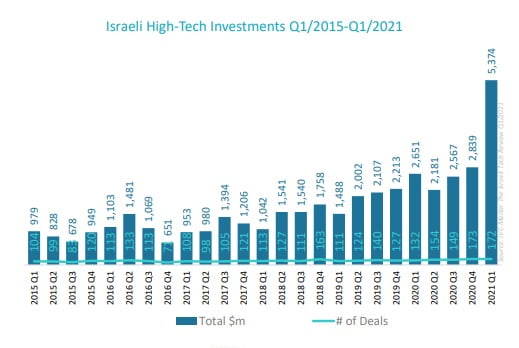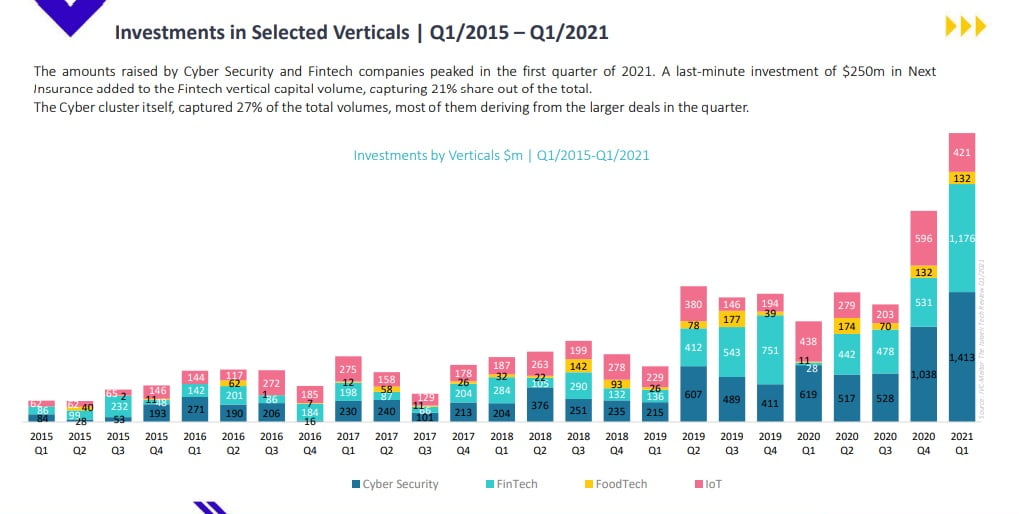Israeli companies and startups attracted over $5 billion in investments in the first three months of 2021 alone, as mega-rounds of $100 million or more reached exceptional levels.
According to a new report released Monday by the IVC Research Center and Law Firm Meitar, a total of $5.374 billion were invested in Israeli companies between January and March 2021 across 172 deals. The amount is 89 percent higher than the last quarter, Q4 2020, and double that of Q1 2020 when the COVID-19 pandemic first began hitting Israel.
SEE ALSO: Israeli Tech Deals Increase 55% In 2020, Despite Devastating Pandemic
Among those 172 deals, 20 exceeded rounds of $100 million each, reaching some $2.96B and accounting for 55% of the total sum raised in Q1 2021, the report indicates. These include Next Insurance with a $250 million round at a $4 billion valuation, Orca Security with a $210 million Series C round led by CapitalG (formerly Google Capital) and Redpoint Ventures, and Drivenets with a $208 Series B funding round at a valuation of more than $1 billion.

Overall, as in previous quarters over the past few years, mid and later funding rounds continued to grow and, in Q1 2021, surpassed all previous quarterly results – 34 such rounds were made this quarter to be exact, totaling $2.18 billion. These rounds doubled in this past quarter from the prior quarter’s capital volume, according to the report.
Cybersecurity and fintech companies nabbed the most funding this past quarter, according to the report, with 27 percent ($1.4 billion) and 21 percent ($1.1 billion), respectively, of the total amount.
Meanwhile, early rounds investments (Seed and A) kept an average pace, while the capital investment volume continued to climb. Investment amounts for both Seed and A rounds deals in Q1/2021 were more than double the average amounts in 2015-2020.
When it comes to investors, deals backed by VCs continued their upward trend, accounting for 96 percent of the deals or $5.18 billion in 134 deals. Non-VC-backed deals continued to shrink as a share of the overall investments and sank to 22 percent, the lowest in a decade. The report suggests this may be due to the ever-increasing valuations of Israeli companies.
Foreign investors were involved in the majority of the investments, 594 investments in 124 deals, since the start of the year, which marks a sharp rise compared to the average of under 400 quarterly investments in 2019-2020, the IVC report showed. Israeli VCs participated in 403 investments during Q1 2021.
Sign up for our free weekly newsletter
Subscribe
Separately, M&A transactions accounted for $2.07 billion (33 transactions) of total capital intake, with IVC saying these figures support the return to normality after the slowdown in such activity in 2020.
The public market also continued with the same level of activity as in the second half of 2020, IVC noted. In Q1 2021 the research center recorded 21 IPOs, most of them (19) in TASE. The “big money,” IVC said, was on Wall St. with Playtika’s IPO ( and third exit) on the Nasdaq, amounting to $2.16 billion.
Despite the record-breaking numbers, the IVC report included words of caution and noted that though the overall VCs share, 78 percent of all deals, is the highest in a decade, non-VCs investors (like private investors) appeared to stay away this quarter because the valuations may have been too high. Additionally, the research center said that the exponential growth in dollar amounts is highly correlated with Nasdaq Index valuations which “have suffered lately from a change in investor sentiment.”
This implies that Israeli tech financing activity may be headed for a downturn in the next two quarters.
SEE ALSO: Israeli Companies Raised Record $1.44B In January Alone – Report
“COVID-19 strongly impacted Israel in 2020. The year 2021 started on a much more positive note for the Israeli high-tech industry, resulting in the record quarterly capital intake, as well as a rebound in exit proceeds, demonstrating a bustling quarter in local initial public offerings activity,” said Marianna Shapira, research manager at IVC.
“However, this robust quarter has been successful mostly for the growth stage, veteran companies that have been accepted on a global scale, and possess long-term connections with the foreign investors community. A different picture can be seen on the other scale of the Israeli startups’ scene. Though younger startups enjoyed some increase in capital intake, their numbers didn’t climb up, which implies that there is much harder competition among companies seeking capital,” she added.
Related posts

Editors’ & Readers’ Choice: 10 Favorite NoCamels Articles

Forward Facing: What Does The Future Hold For Israeli High-Tech?

Impact Innovation: Israeli Startups That Could Shape Our Future




Facebook comments